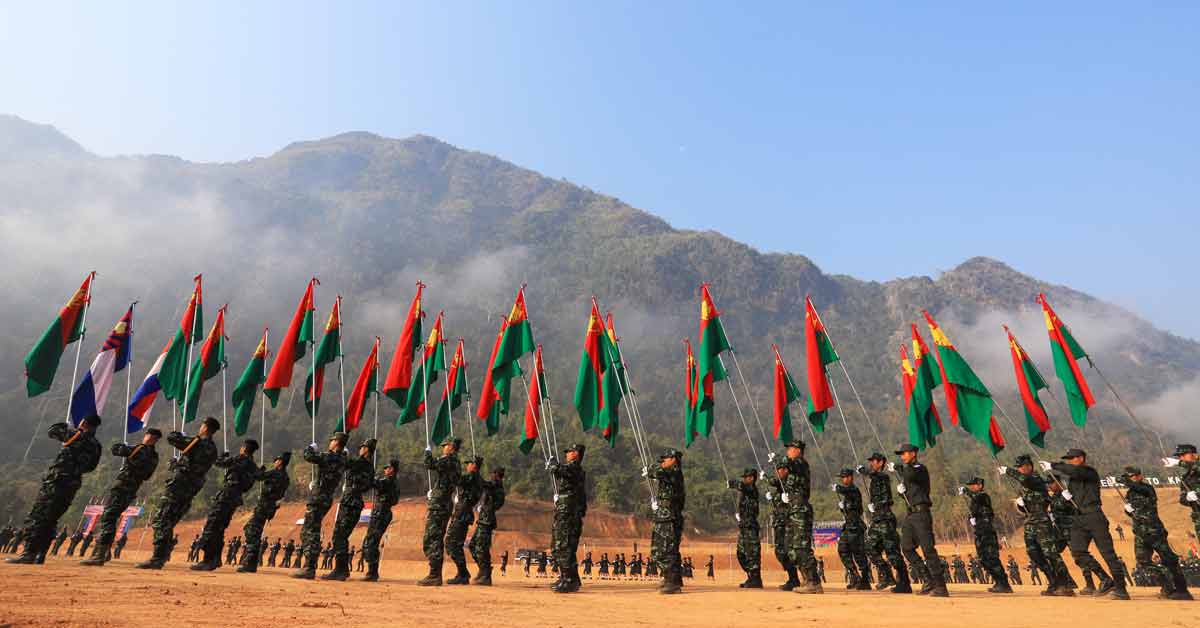The Karen National Union (KNU) is one of the ethnic armed organisations that has attacked Myanmar’s military since its February coup.
KNU Brigade 5 seized two military outposts in Papun District in Karen State and blocked food deliveries to military troops based in Papun, prompting the military to carry out airstrikes, which killed several people and forced thousands to flee their homes.
Besides military action, the KNU is negotiating with the Committee Representing the Pyidaungsu Hluttaw (National Parliament), the CRPH, a body representing elected National League for Democracy (NLD) MPs, to discuss establishing a federal union.
KNU Brigade 5 spokesman Padoh Mahn Mahn told the media about the situation in Papun and the KNU’s talks with the CRPH.
How Is The Fighting Between The Military And KNU Brigade 5?
There were bombings from 27 to 31, March. There has not been bombing since 1 April. But it is not yet safe and there is still air reconnaissance.
We have seen a unilateral ceasefire announcement by the military council. It has stopped attacking perhaps because of its ceasefire. Perhaps, they are making preparations, citing a ceasefire.
How Are The Displaced Coping?
The villagers dare not return home. Some of them fled to the Thai border but the majority are hiding in caves and forests to avoid further bombing. Some are in Thai forests and are struggling to find food and shelter.
Did The Airstrikes Deliberately Target Karen Villagers?
All the people who were killed or injured are villagers. All the buildings damaged are inside villages. We can say that the military targets civilians. This has never changed since the very beginning. They attack Karen fighters but they never spare villagers. Everyone has seen that they have brutally killed unarmed civilians even in cities which are not conflict zones. Such bombing is common to us.
What Is Your View On The CRPH Federal Democracy Charter? Did Brigade 5 Participate In Drafting The Charter?
They consulted the KNU as a whole rather than Brigade 5. Since they started drafting the charter, the KNU participated as an armed revolutionary organisation. The KNU central committee leaders participated in the process.
The CRPH Talked About Establishing A Federal Army With Ethnic Armed Organisations? What Are The Chances Of That?
We don’t see clear principles about a federal army in the charter. But we can see they will establish defence forces. On our participation in any proposed army, ethnic groups already fight for their autonomy. So, we will continue to defend our land.
While the CRPH has issued the federal democracy charter, it has also scrapped the 2008 Constitution. We welcome that. We are satisfied to an extent with the charter to establish a federal union.
However, there is a question about how to overcome obstacles in the process of implementing the charter.
Do You Mean Many Things Remain To Be Done To Establish A Federal Army?
The armed organisations have political backgrounds, clear political objectives and territories. It would be pragmatic to establish a federal army based on the existing ethnic armed organisations.
We have to defend and repulse the injustice and violence of the military council. A federal army can be established either by adopting a new constitution or based on existing armed organisations.
We Heard That Ethnic Groups Are Concerned The CRPH Will Renege On Commitments If Aung San Suu Kyi Is Released?
Many expected Daw Aung San Suu Kyi to amend the 2008 Constitution. But there was no tangible progress after five years. What’s worse, the NLD only looked to get along with the military. It did not just ignore ethnic armed organisations but adopted policies to suppress them. These things still haunt us.
However, under the current political landscape, if the CRPH is totally committed to implementing a federal charter, we have nothing to worry about. Aung San Suu Kyi might now understand that she was wrong to think she could change the military and that her national reconciliation efforts have failed. Though we have reasons to be concerned, we assume that Aung San Suu Kyi understands this now.
This article was first featured on 6 April, 2021 in The Irrawaddy.
Related Articles:
